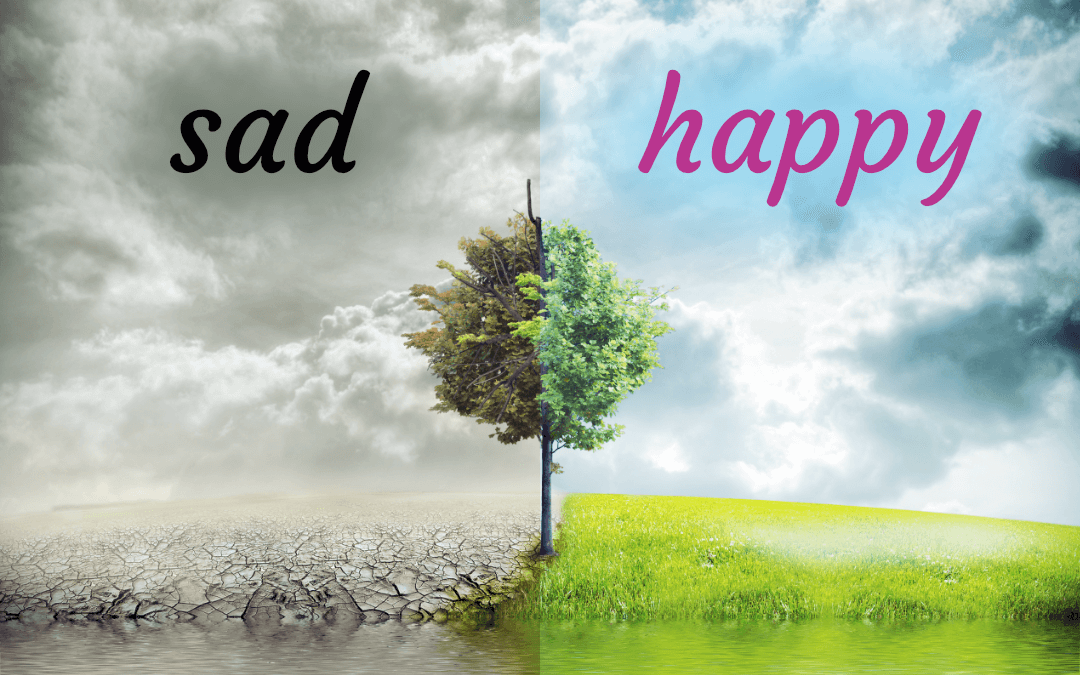Ever had too much of a feeling? Too much worry, too much anger, too much sadness. Just too much. A lot of our daily habits are ways to cope with all those emotions and feelings raging through our bodies and minds.
By cope, I mean suppress and ignore them. Nothing numbs emotions as efficiently as scrolling through social media. Except maybe binge watching a series on a streaming service.
Why do we do this? Because negative emotions and even strong positive emotions are uncomfortable, sometimes even unbearable. Most of us never learned to feel our feelings. Instead, we have been encouraged from an early age on to suppress, ignore and numb our emotions. Don’t cry. Have a piece of candy. Don’t laugh too loud! Pull yourself together.
Wouldn’t it be nice to feel nothing? What if we could switch emotions off? Just so we could take a break. Wouldn’t that make our lives so much easier?
The short answer is, absolutely not. We can’t turn off emotions because they are essential for our lives. Why?
I’m so glad you asked!

Reason 1: Survival
Emotions are literally necessary for your survival.
Fear keeps you safe. If you see a danger, fear triggers a chain reaction in your body and your mind. Hormones are released into your blood stream, your heart rate increases, your vision narrows and blood flows into your arms and legs. This reaction prepares you to either fight or run away as fast as possible. Your thoughts narrow too. All you can think about is the danger in front of you.
Curiosity keeps you motivated to try new ideas that might just make your life easier. Disgust prevents you from putting stuff into your mouth that can make you sick. It’s also what keeps you away from something (or someone) that’s potentially infectious. Happiness draws you to people and things that are good for you and your well-being.
By triggering reactions in your mind and your body, emotions make you act. They set you in motion, if you will. Sadness, for example, makes you cry. When you do, you release stress hormones in your tears and crying stimulates the release of endorphins, hormones that make you happy again.
Thus, emotions help you survive and cope with life by setting you in motion. Every emotion has a specific purpose. Worry helps you rehearse uncertain situations, frustration reminds you to take the break your brain needs and loneliness motivates you to connect with other people.

Reason 2: Connection
Even if you are an introvert, you communicate with other people in some way. That’s because we are social beings. We all need to connect with each other. Loneliness makes you sick, while connection boosts your mood and overall happiness with life.
How do we connect? Through emotions and feelings. We are happy together by sharing a laugh, bond over anger about the boss’s latest hare-brained idea, and hug when we are sad. Emotions and feelings connect us with each other.
That is one of the reasons why being vulnerable, meaning sharing negative feelings, is an effective way to deepen friendships. Being vulnerable inspires others to be vulnerable too allowing you to bond over the same insecurities and fears or simply because you realise that we all have worries.

Reason 3: Meaning
Wouldn’t it be nice to feel nothing? No, because when you don’t feel a thing, nothing matters. Emotions give everything in your life meaning. The amygdala is not just the centre for emotions but also plays a vital part in memory. Everything that happens to you, every action you take, is tagged with an emotion.
It’s your brain’s way of organising the insane amount of information you collect every day. Scary person? Tag: fear. When you see them again, you’ll stay away. Delicious chocolate releasing dopamine into your system. Tag: happiness. You buy more chocolate.
Let’s look at a more complex example. Sam tries to solve a math equation. It’s difficult. Tag: frustrating. They reluctantly ask their older sister for help who gets impatient. Tag: uncomfortable. Sam finally solves the problem and looks at their watch. It’s so late. Tag: impatient and annoyed.
Sam goes outside and plays basketball. Tag: fun. Their friend comes over and they play a few rounds together. Tag: happy. Afterwards Sam is very hungry and makes themselves a delicious sandwich. Tag: satisfied. They sit down on the couch. Sam’s muscles relax. Tag: calm.
Decision time: What do you want to be when you grow up, Sam? Math teacher? Or athlete?
The amygdala tags everything you do, everything that happens to you with an emotion and by doing so it adds meaning to your life. Without meaning, everything would be the same and you couldn’t make a decision. But thanks to all those tags, choice becomes possible and often easy.
And by choice I mean conscious and unconscious choices.

Reason 4: Filter
Every day you are bombarded with information. If your conscious self, the part that is you, had to process all of it, you would go insane. So, the Reticular Activating System (RAS) in your brain chooses what is forwarded to your consciousness.
The RAS’s only job is to make sure you get what you want. Whatever resonates with your beliefs, wants and your emotions is let through. Everything else is filtered out.
If you want to buy a new winter coat, for example, you suddenly notice all the different winter coats others are wearing. You see what’s out there and what colours are currently popular which helps you narrow down your own choice.
And your beliefs? Very powerful. If you think you are great with money, you notice every smart money decision you make. All the mistakes don’t even show up on your radar. You also notice great invest opportunities, are constantly inspired to come up with ideas for how to make more money, and so on.
This is powerful stuff. Especially, when you realise that emotions give everything in your life meaning. If your amygdala tags anything as unimportant, like dirty socks on the floor, you will literally not notice them. Your eyes will see them and send the information to your brain, along with a ton of other information. But your RAS will not forward the socks to your conscious mind if they were tagged as “boring” or “irrelevant”.
If, however, your partner spent twenty minutes telling you off for constantly leaving dirty socks on the floor, the socks are now tagged with a different emotion – “annoyed” or “guilty”. You notice them so you can pick them up.
It gets even weirder though. Your RAS will show you information to keep you in your current emotional state. If you are happy? You notice smiling people because you will smile back, which releases happiness hormones, keeping you happy.
If you are sad, suddenly all those negative headlines are everywhere! Suddenly, your social feed is stuffed with sad stories. The happy ones are still there, but you scroll past those because your RAS shows you the sad stuff, to keep you sad.

Reason 5: Guidance
Because the amygdala tags everything automatically these tags can be a brilliant guide to what it is you really want. Figuring out how you feel about something is the easiest way to help you make an informed decision. Practice to recognise and acknowledge your feelings on a regular basis so you can use them as a guide to deeper understanding.
Here’s what that looks like in action: You are absolutely livid when your partner leaves dirty socks on the floor. Instead of yelling at them to pick up after themselves, you notice your anger and pause. You take two minutes to feel the wave of emotion ripple through your body.
Then you ask yourself why the socks make you so angry. Could it be because they trigger a memory of your dad who never helped out your mom and you project their issues onto your relationship? Maybe you asked repeatedly to have them picked up and now feel rejected and unheard. Or the smell just makes you physically uncomfortable.
Only you know the answer. Your emotions are a guide to what is important to you. Practice self-awareness and you can figure out why these things matter to you. Once you have that clarity, making decisions and taking action suddenly becomes easy.

So you see, emotions are imperative for your life. They prevent you from taking unnecessary risks, allow you to connect with others, give meaning to your life, serve as a filter for information and tell you what really matters to you. They are a mechanism that developed so you can lead a happy and fulfilled life. Emotions are brilliant!
Especially, if you are connected to your emotions. Because when you know what goes on in your mind and your body as it happens you can figure out what those feelings mean to you. You can decide if they serve you. And if they don’t, you can actively change them to more useful emotions and feelings so you can make better decisions and take better actions.
That’s the power of self-awareness and why it is the most important Emotional Intelligence skill to learn and practice. So if you let them, if you practice self-awareness to be in tune with them, emotions and feelings will make your life easier because that’s why we have them in the first place.
Your content goes here. Edit or remove this text inline or in the module Content settings. You can also style every aspect of this content in the module Design settings and even apply custom CSS to this text in the module Advanced settings.
